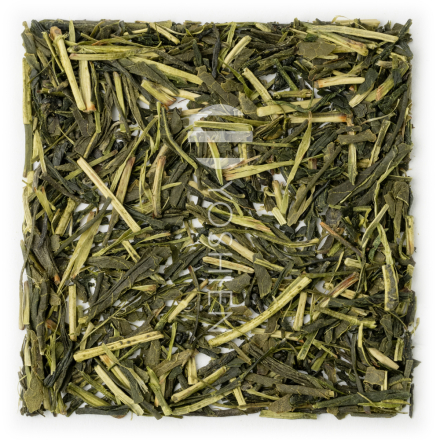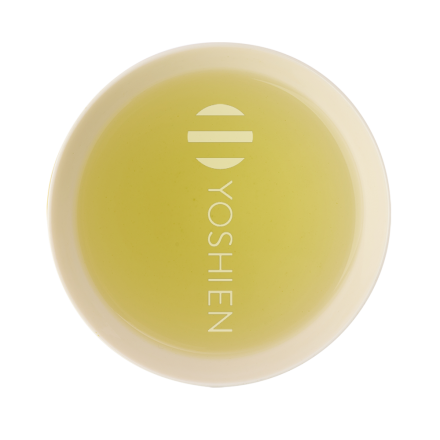NIIKAWA SEICHA
SINGLE-CULTIVAR ORGANIC SENCHA FROM THE HIGHLANDS OF FUKUOKA
| Tea Farm: |
Niikawa Seicha |
| Terroir: |
Ukiha, Fukuoka, Japan |
| Elevation: |
400m above sea level |
| Organic Cert.: |
EU certified organic & JAS organic since 2001, pesticide-free cultivation without artificial fertilisers since 1973 |
| Focus: |
Powerful organic mountain sencha, fukamushi, single-cultivar teas and rare cultivars |
Since 1973, Niikawa Seicha (新川製茶) have been growing their teas without any pesticides or artificial fertilisers in the highlands of Fukuoka, characterised by deep forests and steep rice terraces. It took more than 10 years of time and many bitter setbacks until the painstaking conversion to organic cultivation finally produced healthy, vigorous tea plants – from which our tea farmer Yuhachiro Higuchi nowadays produces first-class single-cultivar sencha as well as many other exclusive teas such as oolong, wakocha, hojicha, and karigane. Proprietary Bokashi fertiliser, rich in nutrients and micro-organisms, contributes to the healthy growth and premium taste of the tea plants. The tea plantations are seen by the Higuchi family as part of a larger biotope, where many kinds of insects and bugs have their rightful place as a matter of course. "We produce for the people who like to have safe and natural food, not for the wholesalers," says Mr Higuchi, "and I am convinced that this is reflected in our tea fields." From cultivation to steaming and rolling the tea to packaging, the entire production chain is in the hands of Niikawa Seicha, which is especially noteworthy given the variety of teas produced. Mr Higuchi is particularly proud of his deeply steamed sencha of rare cultivars such as Yamakai, Asatsuyu or Asanoka, with a total of more than 10 different cultivars being grown in the picturesque tea fields.
THE "MOUNTAIN TEA FROM UKIHA"
The Nuruki family farm is located in Chiran, a region in the southwest of Kagoshima. Kagoshima itself is the most south-westerly prefecture on the Japanese southern island of Kyushu and is characterised by a warm, humid, subtropical climate. Separated from the famous green tea mecca of Yame by only a few kilometres of mountainous landscape, the tea fields of Niikawa Seicha are nestled in the wooded and hilly terraced landscape in the remote southern highlands of Fukuoka. Despite the proximity to Yame and especially to the immediately adjacent village of Hoshino – known for its outstanding Gyokuro and fine Matcha – Niikawa Seicha deliberately refrains from associating their teas with these well-known terroirs by name. Predicated as "Ukiha no Yamacha" (うきはの山茶) or "mountain tea from Ukiha", the tea is marketed by the Higuchi family with self-confidence and pride in Ukiha's special microclimate. First and foremost, it is the crystal-clear mountain water – officially listed as one of Japan's "hundred famous spring waters" (Hyakusen Meisui 百選名水 ) – that gives the tea a profoundly pure and clear taste, and is also used by Ukiha residents as their daily drinking water. As the tea fields are located in mountain valleys, there is a very distinctive mountain climate with large differences between day and night temperatures as well as abundant morning fog. This not only naturally shades the tea leaves, but also traps the subtle scent of the mountains in the leaves, which is then slowly absorbed and stored by the tea plants during the day. A special feature of the tea fields of Ukiha is the particularly good drainage due to the steep terraced landscape - originally, mainly rice was grown here. It was not until the Niikawa Seicha Factory was built that these were increasingly converted into tea fields, with rice and also fruits such as persimmons and grapes of excellent quality still being grown to this day, especially in the lower-lying valleys in the foothills.
ORGANIC PIONEERING WORK OF THE HIGUCHI FAMILY
The Niikawa Seicha Factory was originally set up as a community project by farmers from the Niikawa district, but after a short time it proved to be unprofitable and was eventually bought by the Higuchi family. Our farmer's father learned professional tea cultivation from a well-known tea producer in Yame, and like many other tea farmers at the height of the Japanese growth miracle, they set about expanding the fields as quickly as possible and keeping them productive with artificial fertiliser and pesticides. Soon, however, our farmer's father began to suffer attacks of weakness, until one day he could no longer get out of bed. Diagnosis: poisoning with pesticides. This was the reason for the radical change to a way of cultivation in harmony with nature – without artificial fertilisers and without pesticides or other poisons. For more than 10 years, the family had to live off forestry as much as possible, because the tea plants were initially decomposed by pests, turned red from disease and could hardly be sold. But convinced of their own vision, the Higuchi family did not let themselves be dissuaded from the arduous organic cultivation, for which they were finally rewarded after many years of perseverance with very strong, healthy and above all extremely tasty tea plants.
"EVERY TEA FIELD IS ITS OWN FOREST"
This vision was taken further by our tea farmer Yuhachiro Higuchi, who also had the tea farm qualified for the JAS organic seal in 2001, with its notoriously strict requirements. Organic cultivation is extremely laborious – weeding, for example, has to be done by hand, as larger machines cannot be used on the mountain slopes. Nevertheless, cultivation in harmony with the natural environment is a matter of course and also a moral imperative for Mr. Higuchi – because pesticides would not only harm him and his family themselves, but also the consumers of the teas as well as the inhabitants further down the valley – and not least the rich biotope that the tea fields represent. "Each tea field is its own forest", as Mr Higuchi likes to say, and the presence of beetles and insects fills him with joy and gratitude - as they choose his tea fields as a place to live and breed. Instead of artificial fertiliser, Nuruki Seicha's teas are grown using only organic materials such as rice bran or oil cake, as well as specially made bokashi fertiliser. For this, bamboo and other woods are felled, crushed and then fermented before being added to the fields. In addition, the soil is enriched with "Kindo", a mixture with over 100 microorganisms, to ensure optimal accessibility of nutrients for the tea plants. Powerful bright green tea shoots in spring, glittering golden fireflies in summer, vermilion "spider lilies" in autumn and deep white blankets of snow in winter adorn the tea fields depending on the season, illustrating the beauty and purity of Ukiha's nature.
POWERFUL SINGLE-CULTIVAR FUKAMUSHI SENCHA
The core of Niikawa Seicha's tea cultivation is made up of high-quality single-cultivar teas from often rare cultivars such as Asanoka, Asatsuyu, Yamakai or Harumidori. Mr. Higuchi deliberately wants to set himself apart from the mainstream and mass market, where long-established but rather unusual cultivars such as Yamakai with its distinctive herbal aromas of mint and sage have little appeal. The teas are steamed for longer than usual so that the special aroma and stimulating fragrance of the tea can be released in the best possible way - with a rich sweetness and a restrained, very fine bitterness. In addition to sencha, many other tea specialities are also grown and sold directly in the company's own tea shop on the main street of Ukiha, including, for example, the finest karigane stem tea with no less fresh fragrance and full, creamy body. In total, about 7 hectares of tea plantations are cultivated, on which over 10 different cultivars are grown for Niikawa Seicha's diverse tea range.
NIIKAWA SEICHA TEAS









